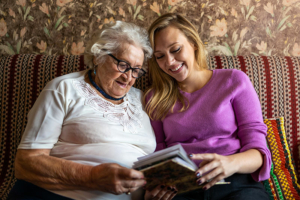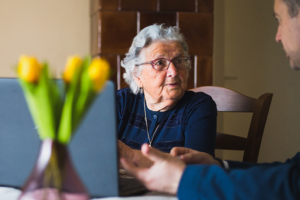Can You Handle Embarrassing Dementia Behaviors in Public?

If you’re not sure how to handle embarrassing dementia behaviors in public, these tips can help.
Dementia is unpredictable, to say the least. It can transform a person’s mood, personality, and behaviors in the blink of an eye. When you’re at home caring for a person with dementia, these changes can be hard enough to manage. But what happens when embarrassing dementia behaviors arise when you are at a grocery store, restaurant, or hair salon?
Simple Tips to Change Cringeworthy to Calm
Fear of a public outburst can make you want to eliminate venturing out at all with someone with Alzheimer’s or another type of dementia. However, being out in the community is very important. It gives someone with dementia a feeling of purpose, eases loneliness and isolation, offers opportunities to socialize, and much more.
Understanding how to cope with an uncomfortable situation before going out is key. These recommendations can help.
- Keep calm. Your demeanor and attitude are highly contagious to a loved one with dementia. Take a deep breath and give yourself a pep talk before stepping out the door. Remind yourself to remain calm and patient, regardless of what happens.
- Carry cards. If you are worried about how embarrassing dementia behaviors may impact others around you, create some small business-sized cards that you can discreetly hand out. They can simply state, “Please forgive any impolite actions or outbursts. These are the result of dementia.”
- Track triggers. Keep a journal to make note of details on difficult behaviors in public and then look for commonalities. You might find, for example, that the individual does well in a small store or restaurant, but becomes distraught when there are large crowds, too much noise, or bright lights. There might be a specific time of day that is more distressing to be out, or physical needs could be an issue, such as hunger, thirst, pain, fatigue, or the need to use the restroom.
How In-Home Care Can Help
Our dementia care experts are available to help manage the effects of the disease, with patience, skill, and creativity. As seasoned experts who are fully trained in a wide range of dementia care needs, we have seen it all! We understand just how to restore calm to somebody who is distressed or agitated, ensuring respect and dignity throughout an outburst.
A few of the many challenging symptoms of dementia we are able to help manage include:
- Aggression
- Sundowning
- Hallucinations and delusions
- Wandering
- Anxiety
- Confusion and disorientation
- And more
Whether you are looking for just a couple hours of respite care to allow time for you to take a break, overnight support or live-in care to ensure safety and wellbeing while you get much-needed rest, or anything in between, we’re here for you.
Give us a call at 954-486-6440 for more tips and resources, and to learn more about our specialized in-home dementia care in Tamarac, Parkland, Fort Lauderdale, and the surrounding areas.









 Everyone goes through good days and bad days, and everyone is entitled to negative thinking or irritability every now and then. If you are caring for an older adult who appears to have fallen into a routine of continual negativity and complaining, there could be a reason for it. It’s worthwhile to explore whether or not a health issue may be the culprit for negative mood changes in a senior.
Everyone goes through good days and bad days, and everyone is entitled to negative thinking or irritability every now and then. If you are caring for an older adult who appears to have fallen into a routine of continual negativity and complaining, there could be a reason for it. It’s worthwhile to explore whether or not a health issue may be the culprit for negative mood changes in a senior.
